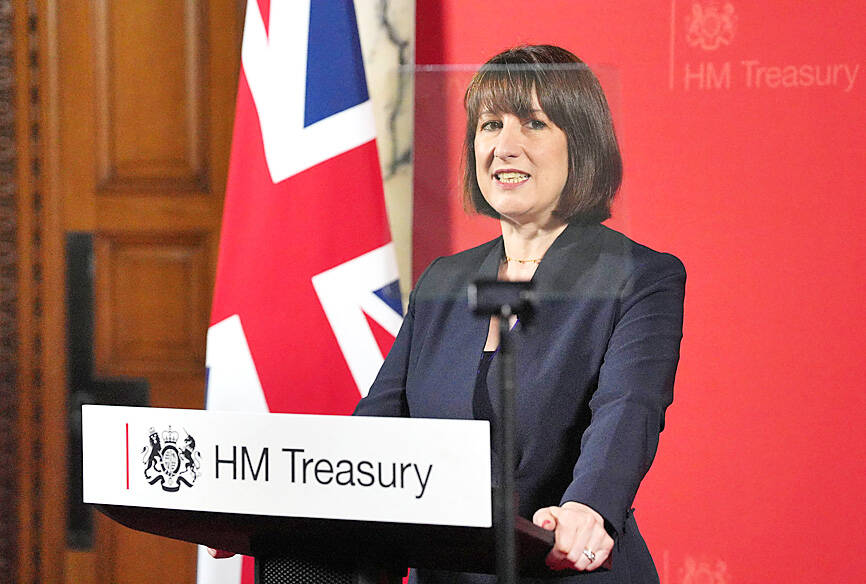New British Chancellor of the Exchequer Rachel Reeves yesterday vowed to immediately “fix the foundations” of Britain’s economy, fueled by onshore wind power and house building, after her Labour Party won power.
In her first major speech since being appointed the UK’s first female chancellor of the exchequer by new Prime Minister Keir Starmer, Reeves said there was “no time to waste” on reversing “the legacy of 14 years of chaos and economic irresponsibility” under Conservative Party rule.
“We are going to get Britain building again,” she said.

Photo: Reuters
Reeves, 45, takes over as chancellor with Britain’s economy recently out of recession, its inflation rate back to normal levels and as the Bank of England prepares to cut interest rates.
Center-left Labour, which had put growing the UK economy at the heart of its manifesto, won Thursday’s general election with a sizeable majority.
The “new treasury analysis I requested over the weekend exposed the opportunities lost” under the Conservatives, Reeves told business leaders in London.
She said that weak growth meant the UK last year missed out on £58 billion (US$74.43 billion) in tax revenue, affecting public services.
However, growing the economy would occur alongside “robust fiscal rules,” with Britain’s debt having ballooned in the past few years owing to huge state spending caused by the COVID-19 pandemic and surging energy prices, she said.
The chancellor said that Labour would double onshore wind energy by 2030, helping the island nation move closer to net zero carbon emissions.
“That means immediately removing the de facto ban on onshore wind in England, in place since 2015,” the Labour government said in a separate statement yesterday.
Reeves also said that she would consult on designating onshore wind projects as “significant infrastructure projects,” meaning planning decisions on those projects would be taken nationally, not locally.
The government would also reform the National Planning Policy Framework, launching a consultation on a growth-focused approach to the planning system before the end of the month, she said.
British Deputy Prime Minister Angela Rayner, who is also responsible for housing policy, would intervene in planning where she believes the regional or national economy would benefit from a development, Reeves said.
The Labour government would also bring back mandatory housing targets, the chancellor said.
They had been ditched by the previous Conservative government in late 2022.
A new task force would be set up to accelerate stalled housing sites, which could speed up developments at several sites across the country where more than 14,000 homes could be built, Reeves said.
Additional reporting by Reuters

TEMPORARY TRUCE: China has made concessions to ease rare earth trade controls, among others, while Washington holds fire on a 100% tariff on all Chinese goods China is effectively suspending implementation of additional export controls on rare earth metals and terminating investigations targeting US companies in the semiconductor supply chain, the White House announced. The White House on Saturday issued a fact sheet outlining some details of the trade pact agreed to earlier in the week by US President Donald Trump and Chinese President Xi Jinping (習近平) that aimed to ease tensions between the world’s two largest economies. Under the deal, China is to issue general licenses valid for exports of rare earths, gallium, germanium, antimony and graphite “for the benefit of US end users and their suppliers

Nissan Motor Co has agreed to sell its global headquarters in Yokohama for ¥97 billion (US$630 million) to a group sponsored by Taiwanese autoparts maker Minth Group (敏實集團), as the struggling automaker seeks to shore up its financial position. The acquisition is led by a special purchase company managed by KJR Management Ltd, a Japanese real-estate unit of private equity giant KKR & Co, people familiar with the matter said. KJR said it would act as asset manager together with Mizuho Real Estate Management Co. Nissan is undergoing a broad cost-cutting campaign by eliminating jobs and shuttering plants as it grapples

Dutch chipmaker Nexperia BV’s China unit yesterday said that it had established sufficient inventories of finished goods and works-in-progress, and that its supply chain remained secure and stable after its parent halted wafer supplies. The Dutch company suspended supplies of wafers to its Chinese assembly plant a week ago, calling it “a direct consequence of the local management’s recent failure to comply with the agreed contractual payment terms,” Reuters reported on Friday last week. Its China unit called Nexperia’s suspension “unilateral” and “extremely irresponsible,” adding that the Dutch parent’s claim about contractual payment was “misleading and highly deceptive,” according to a statement

The Chinese government has issued guidance requiring new data center projects that have received any state funds to only use domestically made artificial intelligence (AI) chips, two sources familiar with the matter told Reuters. In recent weeks, Chinese regulatory authorities have ordered such data centers that are less than 30 percent complete to remove all installed foreign chips, or cancel plans to purchase them, while projects in a more advanced stage would be decided on a case-by-case basis, the sources said. The move could represent one of China’s most aggressive steps yet to eliminate foreign technology from its critical infrastructure amid a